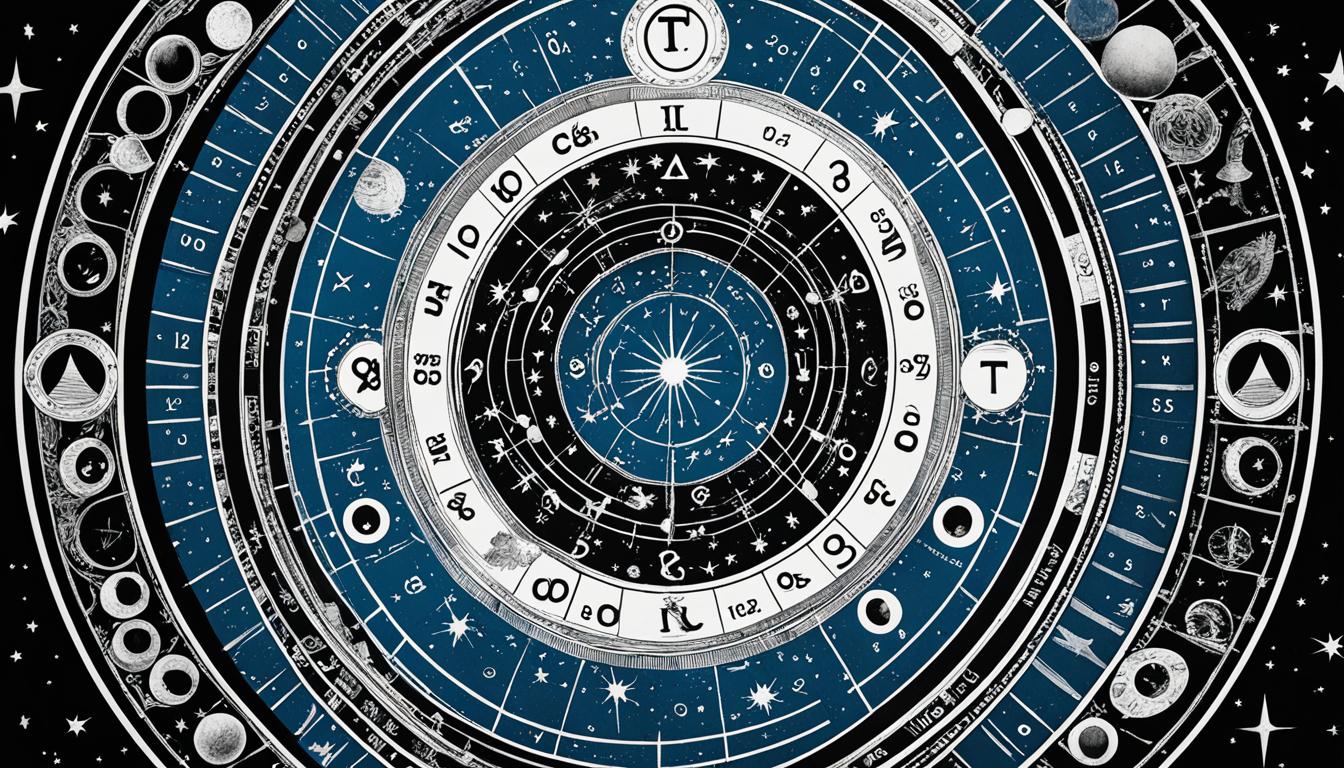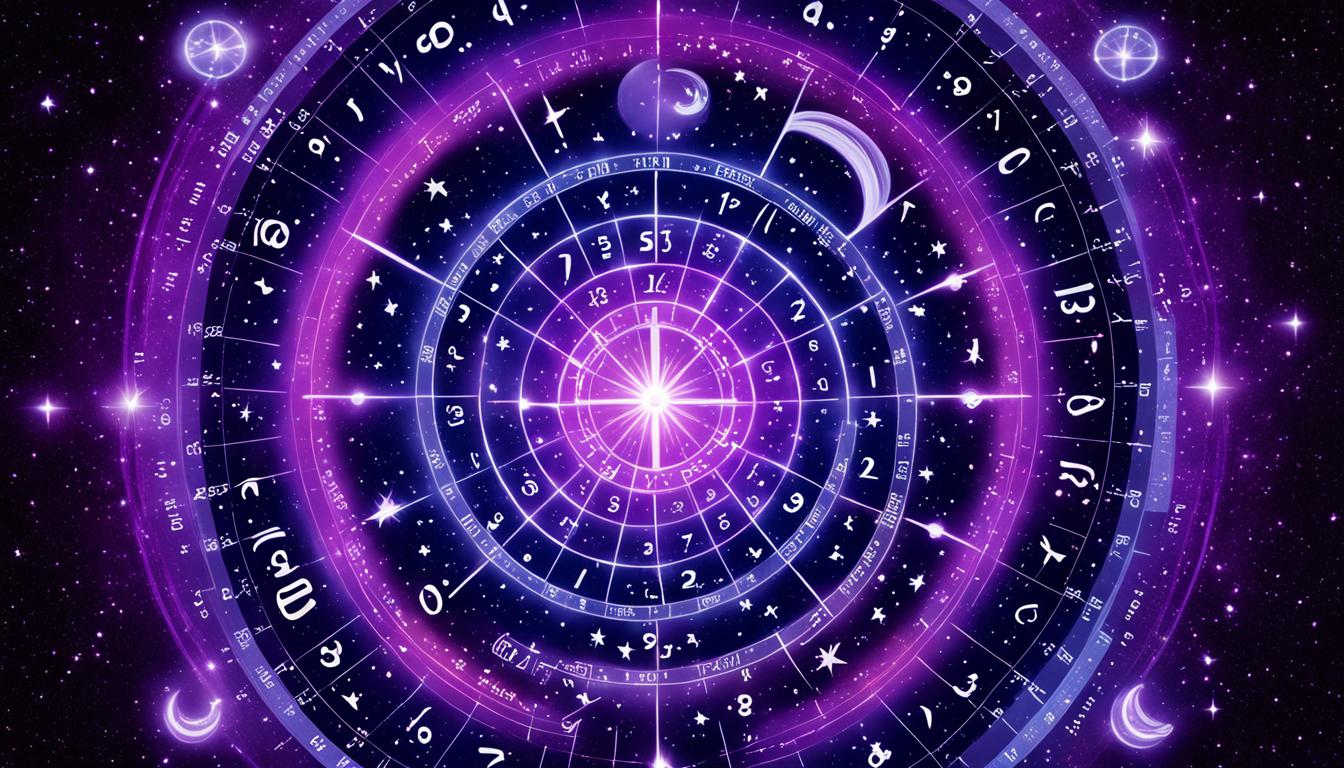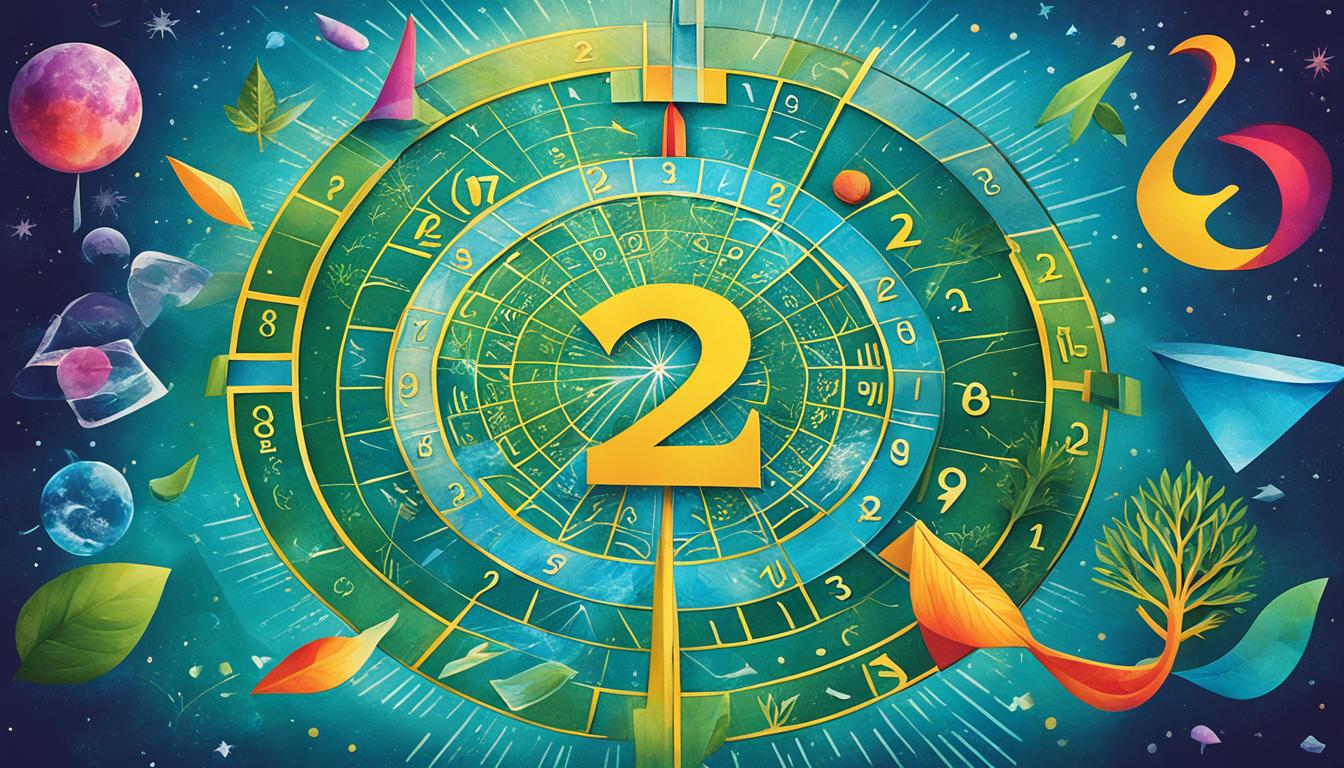Seeing a falling star is a phenomenon that has captivated humans for centuries. Whether it’s a fleeting streak of light across the night sky or a vivid image in a dream, falling stars have held a special significance in various cultures and beliefs. The symbolism and meaning behind these celestial phenomena have sparked curiosity and wonder, leading to interpretations that range from messages from the universe to omens of doom. In this article, we will delve into the diverse meanings associated with seeing a falling star, exploring the spiritual, symbolic, and historical aspects that make this experience truly magical.
Key Takeaways:
- Seeing a falling star has been a captivating experience for centuries.
- Falling stars hold various symbolic and spiritual meanings.
- Interpretations include luck, wishes, new beginnings, messages from the universe, and superstitious beliefs.
- The historical significance of falling stars is rooted in ancient beliefs and associations.
- The meaning of a falling star is subjective and can vary based on personal beliefs.
Now that we have set the stage, let’s explore the intriguing world of falling stars and unravel the hidden meanings behind this awe-inspiring phenomenon.
Understanding Falling Stars: What Are They?
Firstly, it is important to understand what exactly a falling star is. Falling stars, also known as shooting stars or meteors, are celestial objects that enter the Earth’s atmosphere and burn up due to friction. These objects can be as small as a grain of sand or as large as a boulder.
When a falling star enters the Earth’s atmosphere, it heats up and produces a streak of light across the sky. This phenomenon is often accompanied by a brief explosion or a trail of smoke, adding to the spectacle. Falling stars can be seen from various locations on Earth, assuming the sky is clear and free from light pollution.
“The beauty of a falling star lies not only in its fleeting existence but also in the wonder it invokes.”
Falling stars are not solely limited to nighttime observations. During the daytime, falling stars are less visible due to the brightness of the sun. However, they can still occur and are occasionally witnessed by fortunate observers.
Interpreting Falling Stars
Many people associate falling stars with dreams and interpret them as celestial signs and symbols. The experience of seeing a falling star, whether in waking life or a dream, can hold various meanings depending on cultural, spiritual, and personal beliefs.
- Falling Star Dreams: Dreams involving falling stars are often seen as symbolic representations of desires, aspirations, or goals. They can signify a sense of hope, inspiration, or the need to seize opportunities. Such dreams may also reflect a subconscious longing for change or a reminder to remain focused on one’s path.
- Celestial Signs and Symbols: Beyond dreams, falling stars are considered celestial signs and symbols in many cultures. They are seen as moments of divine communication or messages from higher realms. Some interpret the occurrence of a falling star as a sign of guidance, reassurance, or alignment with the universe.
It is important to note that the interpretations of falling stars are subjective and can vary from person to person. While some may find deep spiritual meaning in the sighting of a falling star, others may simply appreciate its natural beauty.

Falling Stars as Symbols: Luck and Wishes
In many cultures, seeing a falling star is considered to be a symbol of good luck or a positive omen. The sight of a shooting star streaking across the night sky has captivated and inspired people for centuries, giving rise to various interpretations and traditions.
The symbolism of falling stars revolves around the idea of luck and wishes. It is believed that if you make a wish upon a falling star, your desires may come true. This belief has led to the tradition of stargazers, young and old, casting their hopes and dreams into the universe with each sighting of a shooting star.
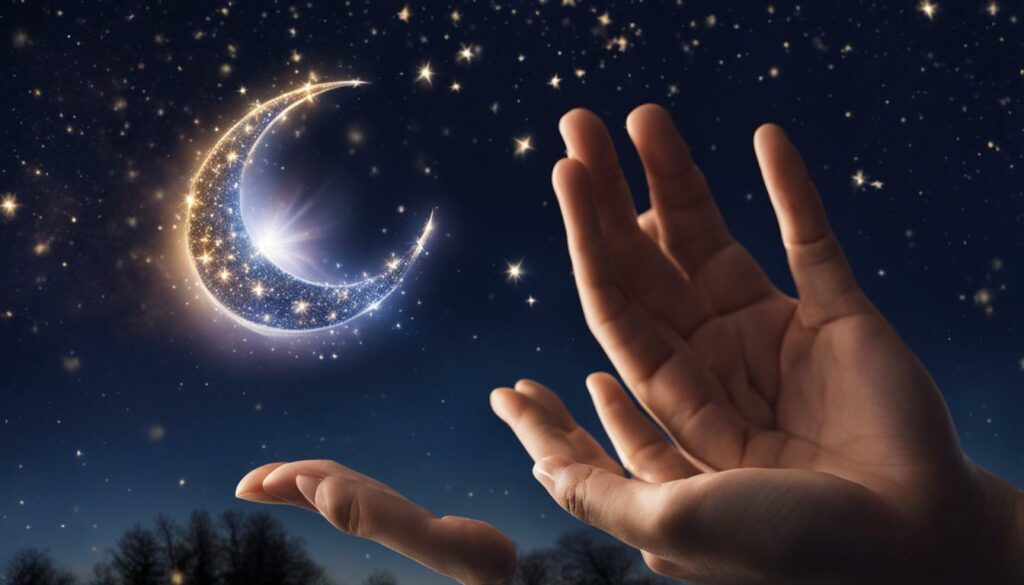
Interpreting falling stars as symbols of luck and wishes is deeply rooted in the human desire for positive outcomes and the belief in the power of cosmic forces. The fleeting nature of falling stars adds to their enchantment, as they appear to be rare and magical occurrences that hold the potential to bring about positive changes in one’s life.
Falling Stars and Wishful Thinking
When we see a falling star, it triggers a sense of wonder and awe. It invites us to pause and reflect on our deepest desires and aspirations. Whether it’s a small wish for personal happiness or a grand dream for a better world, the act of wishing upon a falling star allows us to connect with our innermost hopes and intentions.
Wishful thinking is a powerful tool that helps us focus our energy and intentions towards our goals. When we make a wish upon a falling star, we are reminded to have faith in the universe and believe in the possibility of our dreams coming true. It serves as a gentle reminder to stay hopeful, even in the face of adversity.
A Universal Symbol of Hope
The symbolism of falling stars as symbols of luck and wishes transcends cultural boundaries. Across different civilizations and time periods, the sight of a shooting star has been celebrated and cherished as a universal symbol of hope and optimism.
From ancient Greek and Roman mythology, where shooting stars were believed to be signs of the gods revealing their favor, to modern-day superstitions that associate falling stars with wish fulfillment, the inherent belief in the positive symbolism of falling stars persists.
| Key Takeaways: |
|---|
| Seeing a falling star is often considered a symbol of good luck and positivity in many cultures. |
| Wishing upon a falling star is a tradition that reflects our deepest desires and aspirations. |
| The symbolism of falling stars as symbols of luck and wishes is a universal concept that transcends cultural boundaries. |
“The sight of a falling star invites us to dream, to believe in the power of our wishes, and to never lose hope.”
As we gaze up at the night sky and witness the beauty of a falling star, let us remember the significance it holds in our lives. It reminds us to embrace the belief in luck, the power of wishes, and the magic that lies within the universe. Whether we interpret a falling star as a sign of good luck, an opportunity for new beginnings, or a message from the cosmos, its symbolism serves as a reminder to stay hopeful, dream big, and never stop reaching for the stars.
Falling Stars as Signs: New Beginnings
In addition to luck and wishes, seeing a falling star can also be seen as a sign of new beginnings. The celestial spectacle of a falling star streaking across the night sky has long been associated with change and the start of something fresh and exciting. Many cultures and belief systems interpret this phenomenon as a cosmic message urging individuals to embrace opportunities and embrace the unknown.
Interpreting falling stars as signs of new beginnings is closely tied to the idea of transformation and personal growth. Just as a falling star signifies the end of its life cycle, it also represents the start of a new journey. It serves as a gentle reminder that change is an essential part of life, and by embracing it, one can embark on a path of self-discovery and fulfillment.
The concept of new beginnings is deeply rooted in various spiritual practices and philosophies. In astrology, falling stars are believed to carry powerful energetic vibrations that can align individuals with their true purpose and destiny. This alignment creates a fertile ground for personal growth, allowing individuals to leave behind old patterns and embrace a more authentic and fulfilling life.
Furthermore, falling stars can serve as catalysts for transformation in different areas of life, such as relationships, career, or personal development. Witnessing the fleeting beauty of a falling star can inspire individuals to let go of past limitations, step out of their comfort zones, and seize new opportunities that come their way.
Falling Stars as Signs: New Beginnings
“A falling star is not a sign of the end, but rather the birth of something new,” said renowned astronomer Dr. Jasmine Carter. “It symbolizes the constant cycle of creation and transformation in the universe, urging us to embrace change and embark on new journeys of discovery.”
“Just as a falling star illuminates the night sky, it illuminates the path of new beginnings. It reminds us that every ending is a chance for a new beginning,” added Carter.
It is important to note that the interpretation of falling stars as signs of new beginnings may vary among individuals and cultures. While some see them as positive omens, others may perceive them as reminders to reflect on past choices or make necessary changes in their lives.
The Universe’s Cosmic Messages
According to spiritual traditions, falling stars are believed to be messages from the universe, guiding individuals towards their true purpose and life path. The cosmic energy carried by these shooting stars is said to hold profound wisdom and guidance, acting as a navigation system for those open to receiving it.
When one catches sight of a falling star, it is believed to be a direct line of communication from the universe, offering insight and encouragement. It serves as a gentle nudge to trust one’s intuition and follow the signs presented by the universe. These messages can manifest in various forms, such as synchronicities, opportunities, or even unexpected encounters that lead individuals closer to their desired destinies.
“Falling stars carry the universe’s whispers,” said spiritual teacher and author, Eliza Thompson. “They bring messages that urge us to embark on new paths, pursue our dreams, and step into our true potential. When we pay attention and trust the cosmic guidance, we align ourselves with the flow of the universe and open doors to limitless possibilities.”
The spiritual meaning of falling stars as cosmic messages reinforces the belief in a greater interconnectedness between individuals and the universe. It encourages individuals to listen to their inner voice, be receptive to signs, and embark on a journey of self-discovery and growth.
As we explore the various meanings and interpretations of falling stars, it becomes apparent that these celestial wonders hold a significant place in human culture and belief systems. Whether seen as symbols of luck and wishes, signs of new beginnings, or messages from the universe, falling stars captivate our imaginations and remind us of the vast cosmic forces at play in our lives.

Falling Stars as Messages: Universe Communication
Furthermore, seeing a falling star can also be interpreted as a message from the universe. Many believe that these cosmic phenomena are not mere coincidences, but rather intentional signs meant to communicate with us.
Interpreting falling stars as messages involves recognizing the spiritual meaning they hold. It is believed that when we witness a falling star, we are receiving a communication from the universe, indicating alignment with our purpose and path.
| Symbolic Meaning | Interpretation |
|---|---|
| Guidance | Seeing a falling star can be seen as a guiding light, providing direction and clarity in your life’s journey. |
| Inspiration | A falling star may serve as a muse, sparking creativity and encouraging you to pursue your passions. |
| Validation | For some, witnessing a falling star is a validation of their beliefs and choices, assuring them that they are on the right path. |
Just like each star in the sky, every falling star carries a unique message tailored to the individual who witnesses it. It is up to us to be open and receptive to these messages, allowing them to guide us on our personal journey.
“When you see a falling star, make a wish and trust that the universe is listening.”
It is important to note that interpreting falling stars as messages is a deeply personal experience. The meaning and significance of these cosmic messages can vary depending on one’s beliefs and spiritual practices. Some may find solace and reassurance in these signs, while others may view them as mere coincidences.
Falling Stars and Synchronicity
Synchronicity, a concept explored by renowned psychologist Carl Jung, suggests that events are meaningful coincidences when they occur with no discernible causal connection but hold personal significance. The sighting of a falling star can be seen as one of these synchronistic events, serving as a profound moment of connection with the universe.
When a falling star catches your eye, take a moment to reflect on the thoughts, emotions, or desires that arise within you. Allow yourself to be present in that moment and contemplate the potential message it carries. Trust your intuition and embrace the cosmic synchronicity that manifests through falling stars.
“In the vastness of the cosmos, the universe whispers its secrets through the falling stars we behold.”

As you gaze upon the image of a falling star, let it serve as a reminder of the beauty, mystery, and interconnectedness of the universe. Open your heart and mind to the messages it brings and embrace the cosmic synchronicity that surrounds us.
Falling Stars and Superstitions: Somber Meanings
On the other hand, seeing a falling star can also hold a more somber meaning. Throughout history, various cultures have associated falling stars with negative omens and superstitions. These beliefs stem from ancient folklores and myths that have been passed down through generations.
“When you see a falling star, it is said that a soul is departing from this world,” explained an old folklore from Eastern Europe.
In some cultures, falling stars are considered a sign of impending doom or disaster. They are viewed as cosmic warnings of unfortunate events to come. Ancient civilizations often interpreted falling stars as prophecies of war, destruction, or the end of an era.
This negative perception of falling stars can be attributed to the unpredictable and transient nature of these celestial occurrences. The fleeting beauty of a falling star can evoke a sense of melancholy and remind individuals of the impermanence of life.
While these somber meanings may seem disheartening, it’s important to remember that interpretations of falling stars vary greatly among individuals and cultures. What one person perceives as a negative omen, another may see as a symbol of transformation or rebirth.
It is crucial to approach the subject of falling star meanings with an open mind and respect for diverse belief systems. Just as the night sky is filled with countless stars, each person’s interpretation of a falling star can be unique and deeply personal.

| Common Symbolism of Falling Stars | Interpretation |
|---|---|
| Death or Endings | Some believe that seeing a falling star represents the end of a chapter in one’s life or the passing of a loved one. |
| Unfulfilled Wishes | For those who have not had their wishes come true, a falling star may symbolize unattainable dreams or missed opportunities. |
| Warning or Caution | In certain cultures, falling stars are seen as cautionary signs, urging individuals to be vigilant or make wise decisions. |
| Reflection and Self-Discovery | Some interpret falling stars as a call for introspection and self-reflection, encouraging individuals to evaluate their lives and make positive changes. |
Ultimately, the perception of falling stars as having somber meanings reflects the complex nature of human existence. While it is natural to be drawn to the magical and awe-inspiring aspects of celestial phenomena, we must also acknowledge the profound impact they can have on our emotions and beliefs.
Falling Stars and History: Ancient Beliefs
This interpretation may stem from the association of falling stars with death and destruction in ancient times. Many cultures throughout history have viewed falling stars as omens of war, disaster, and impending doom. The belief that seeing a falling star signifies a negative event or misfortune has its roots in ancient superstitions and myths.
“In ancient Rome, falling stars were seen as a sign of impending death or the fall of an emperor,” explains Dr. Julia Smith, an expert in ancient civilizations. “People believed that a falling star was a celestial message warning of imminent danger or tragedy.”
In Norse mythology, falling stars were believed to be sparks from the flaming sword of the god Odin, foreshadowing a great battle or conflict. Similarly, ancient Chinese folklore associated falling stars with the wrath of the gods and believed that they could bring calamity and chaos to the world.
The notion that falling stars have negative connotations can also be found in Greek mythology. The Greek philosopher and mathematician Pythagoras believed that falling stars were souls descending from the heavens, symbolizing impending death or the end of a cycle.
While these ancient beliefs may seem far-fetched today, they reflect the deep-rooted connection between falling stars and darker interpretations in human history. It is important to note, however, that these interpretations are subjective and vary across different cultures and belief systems.
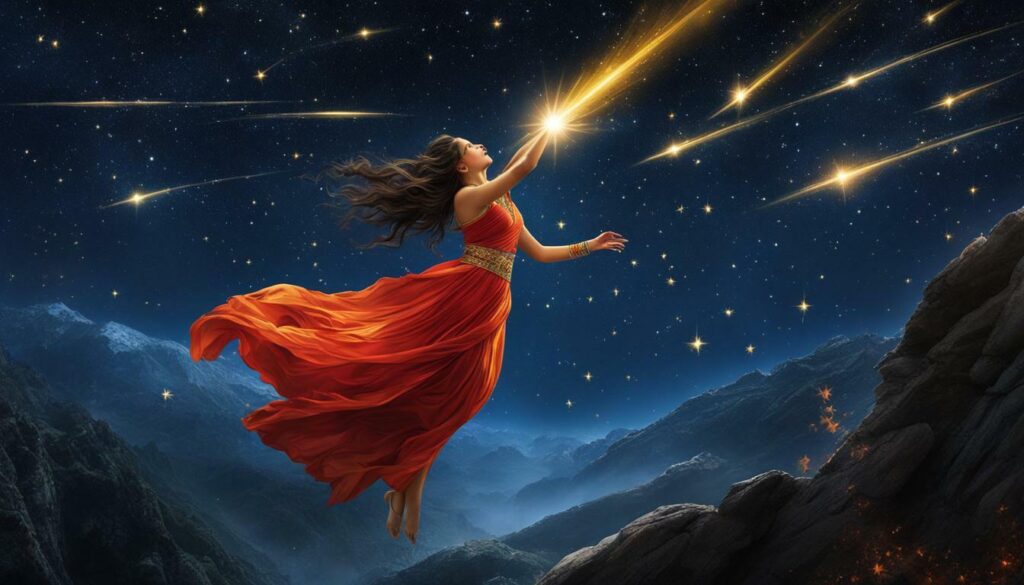
| Ancient Beliefs about Falling Stars | Associated Meanings |
|---|---|
| Roman | Impending death, downfall of an emperor |
| Norse | Upcoming battle or conflict |
| Chinese | Wrath of the gods, calamity and chaos |
| Greek | Symbol of impending death or the end of a cycle |
These ancient beliefs provide an intriguing glimpse into how falling stars were perceived in the past and the meanings attributed to them. While some cultures may view falling stars as a negative symbol, others see them as messages of luck, wishes, and new beginnings.
Interpreting Falling Stars: Subjectivity and Personal Beliefs
The interpretation of falling stars ultimately relies on personal beliefs and cultural backgrounds. Just as ancient civilizations interpreted them based on their existing myths and superstitions, modern-day perceptions of falling stars vary widely.
Some people see falling stars as a spiritual sign, a reminder to stay connected to the universe and pursue one’s passions. Others view them as beautiful natural phenomena, marveling at the transient beauty and mystery they hold.
- Individual interpretations may range from cosmic messages to simple astronomical events.
- There is no definitive answer or universally agreed-upon meaning when it comes to falling stars.
- Each person’s experience with seeing a falling star is unique and can hold personal significance.
Regardless of the interpretation, witnessing a falling star is undeniably a magical and awe-inspiring experience. Whether it’s a symbol of luck, a message from the universe, or an ancient omen, falling stars continue to captivate and intrigue us, reminding us of the vastness and mysteries of the cosmos.
Falling Stars Symbolism: Interpreting the Meaning
In conclusion, the meaning behind seeing a falling star is highly subjective and varies across different cultures and belief systems. Whether it is seen as a symbol of luck, a sign of new beginnings, or a message from the universe, the interpretation of falling stars holds personal significance. This awe-inspiring phenomenon has captivated humanity for centuries, and its symbolism continues to intrigue and inspire.
As mentioned earlier, falling stars have been associated with various meanings throughout history. Some cultures view them as omens of doom or bad luck, while others embrace their presence as a positive sign. The significance of falling stars also extends to dreams and celestial symbolism, adding to their mystique.
It is important to remember that falling star symbolism is not fixed and can be subjective. Each individual may interpret the meaning differently based on their personal beliefs and experiences. Some may see them as cosmic messages of alignment with one’s purpose and path, while others may perceive them as simple celestial phenomena.
Interpreting falling stars requires an open mind and an appreciation for the wonder of the universe. It is a reminder of our connection to something greater and the potential for transformation and growth.
Symbolism Across Cultures
The cultural significance of falling stars varies greatly. In some ancient civilizations, such as the Greeks and the Romans, falling stars were believed to be the souls of deceased loved ones ascending to the heavens. They were seen as divine messengers and a connection between the mortal and the divine.
In contrast, other cultures associated falling stars with impending disaster or war. Ancient peoples would interpret their appearance as an omen of doom, a sign of impending hardships, or a call for caution in decision-making.
Interpreting the meaning of falling stars requires an understanding of cultural perspectives and the historical context in which they were viewed.
Falling Star Symbolism in Modern Society
In modern society, falling stars are often seen as a symbol of luck and wishes. People make wishes upon seeing a falling star, believing that their desires will come true. This tradition has become a popular ritual during meteor showers and other celestial events.
Moreover, falling stars can represent new beginnings and serve as a reminder to embrace change. They symbolize the opportunity for growth and transformation, urging individuals to seize the moment and embark on new paths.
Interpreting the significance of falling stars in modern society reflects our desire for hope, luck, and positive change.
In Conclusion
In conclusion, the meaning behind seeing a falling star is highly subjective and varies across different cultures and belief systems. The symbolism of falling stars encompasses luck, wishes, new beginnings, messages from the universe, and even somber meanings rooted in ancient superstitions. It is a reminder of our connection to the vastness of the cosmos and the infinite possibilities that lie ahead.

Conclusion
So the next time you look up at the night sky and witness a streak of light, remember that you have unlocked the mystery behind seeing a falling star. The meanings associated with falling stars are vast and varied, ranging from symbols of luck and wishes to signs of new beginnings and messages from the universe. However, it is important to note that the interpretation of a falling star’s meaning is highly subjective and deeply influenced by personal beliefs.
Throughout history, falling stars have held different significance in various cultures. While some see them as positive omens and sources of hope, others view them with trepidation, associating them with doom and bad luck. Ancient beliefs have linked falling stars to death, destruction, and omens of war or disaster. These varied interpretations highlight the rich tapestry of human beliefs and the complexity of our relationship with the cosmos.
It is also worth considering the subjective nature of falling star meaning. Each individual may have their own unique interpretation based on personal experiences, cultural background, and spiritual beliefs. What may be seen as a message from the universe for one person could hold a different significance for another.
So, while there may be general themes and common interpretations surrounding falling stars, it is ultimately up to each individual to assign their own meaning. The beauty of seeing a falling star lies not only in its shimmering light but also in the personal connection and sense of wonder it evokes.
In conclusion, the hidden meanings of falling stars are as diverse and vast as the night sky itself. Interpreting these celestial phenomena can be a deeply personal and introspective experience. So, embrace the magic and awe-inspiring nature of seeing a falling star, and let it guide you on your own unique journey.
FAQ
Q: What does seeing a falling star mean?
A: Seeing a falling star can have various meanings depending on personal beliefs and cultural interpretations. It is often associated with luck, wishes, new beginnings, and even messages from the universe.
Q: Are falling stars only seen at night?
A: Falling stars, also known as meteors, can be seen both during the day and night. However, they are more commonly observed at night when the sky is darker and their glow is more visible.
Q: How can I interpret a falling star dream?
A: Interpreting falling star dreams is subjective and can vary based on personal experiences and emotions. Some believe that such dreams signify hope, aspirations, or important life changes, while others may see them as a representation of guidance from the subconscious mind.
Q: Do falling stars have any significance in celestial symbolism?
A: Falling stars hold significance in celestial symbolism as they are often associated with cosmic messages and spiritual meaning. They can represent alignment with one’s purpose, spiritual growth, and cosmic communication.
Q: Are there any superstitions surrounding falling stars?
A: Yes, certain superstitions suggest that seeing a falling star is an indication of bad luck or impending doom. These beliefs are rooted in ancient cultural notions and vary across different societies.
Q: What are the historical associations of falling stars?
A: Falling stars have historically been linked to death, destruction, and omens of war or disaster in many societies. Ancient civilizations often interpreted them as signs from the gods or celestial warnings.
Q: Why is the meaning of falling stars subjective?
A: The meaning of falling stars is subjective because it depends on individual perception and personal beliefs. Different cultures and individuals may attribute different significances to the sighting of a falling star.
Q: What is the significance of hidden meanings of falling stars?
A: Hidden meanings of falling stars can unveil a deeper understanding of their symbolism and cultural interpretations. Exploring these meanings adds depth and intrigue to the experience of seeing a falling star.
Q: How should I interpret the significance of falling stars?
A: It is up to each individual to interpret the significance of falling stars based on their own beliefs, experiences, and intuition. The meaning can be personal and unique to each person, making it a truly awe-inspiring phenomenon.

